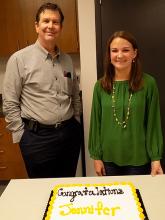
Jennifer Welch successfully defended her PhD thesis, "Semen exosomes: Intrinsic inhibitors of HIV-1 infection", on Thursday, November 1, 2018. She is pictured here with her co-mentor, Dr. Jack Stapleton.
Research
Exosomes are nano-sized vesicles released from most cell types and are found in most body fluids. Healthy cells and cells infected with different viruses release exosomes that may inhibit or enhance infection. Recent research showed that exosomes found in semen of healthy human donors inhibit HIV infection, but that exosomes from blood do not. We tested whether exosomes from HIV-infected donors inhibit HIV, and found that semen exosomes from HIV-infected donors inhibit infection regardless of whether donors are on anti-HIV medications or not on medication. HIV-infected donors’ blood exosomes inhibit HIV if the donor is on anti-HIV medications, but do not inhibit if they are not on anti-HIV medications. We found that this was due to exosomes packaging the anti-HIV drugs taken by the HIV-infected donors.
Illicit drug use is associated with increased susceptibility to HIV and worsening disease, and may cause changes in both the male reproductive tract and generation of exosomes. We determined that donor illicit drug use altered semen exosomes by changing exosomes composition, and these exosomes were less able to inhibit HIV-1 infection. We investigated how semen exosomes inhibit HIV and found that they restrict the virus from copying its genetic information to make more viruses. Our results suggest that regardless of HIV status, semen exosomes are a natural protective factor against HIV. The findings of our work will likely aid mechanistic understanding of how exosomes affect viral infections, and potentially the development of novel anti-HIV therapies.
About Jennifer
Jenny grew up in Afton, a small town in rural Iowa, the best and brightest of two children. Jenny attended Buena Vista University (BVU) in Storm Lake, IA where she double-majored in Biochemistry and Chemistry and minored in Chinese. During her freshman year she began working with Dr. Brian Lenzmeier studying processing of reactive oxygen species by eukaryotic cells. Through Dr. Lenzmeier, Jenny had the opportunity to spend a summer at the Shanghai Institute for Biological Sciences in Shanghai, China working in the laboratory of Dr. Jin-Qiu Zhou on genetic modification of a yeast strain. Jenny became interested in viruses after completing a summer undergraduate research fellowship (SURF) at Mayo Clinic in the laboratory of Dr. Stephen Russell, where she studied vesicular stomatitis virus (VSV) neutralization by non-immune human serum. In her final year at BVU, Jenny was able to continue a collaborative project with Dr. Russell’s lab and Dr. Lenzmeier, comparing non-invasive imaging techniques of tumors in mice.
In the fall of 2014, Jenny began her PhD studies in the Biosciences program, and has worked in the laboratories of Dr. Chioma Okeoma and Dr. Jack Stapleton. Through the advisement of her mentors, Jenny has had the opportunity to characterize the composition and function of body-fluid derived exosomes and their role during HIV-1 infection, and to experiment in other projects exposing her (not literally, hopefully) to a range of viruses.
Outside of the lab, Jenny enjoys reading, traveling, and spending time with the family dogs, Gunner and Wrangler, and her dog-niece, Nala. Jenny provides a foster home for Mittens, the cat of Dr. Wadie Mahauad Fernandez, whose surly demeanor has landed her an extended vacation living with Jenny’s brother and dog-niece to work on her social skills.